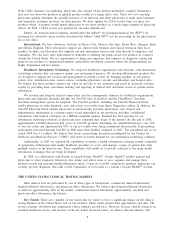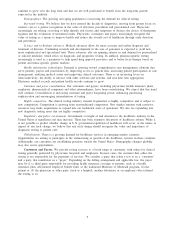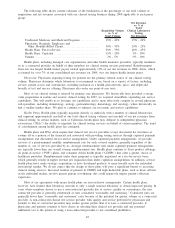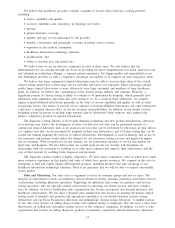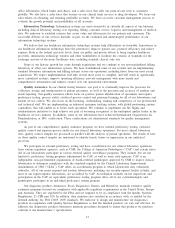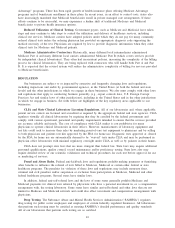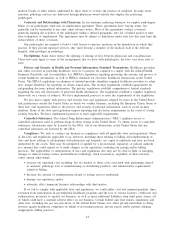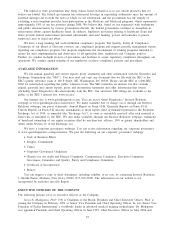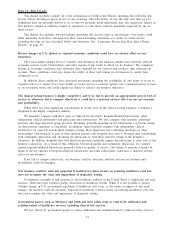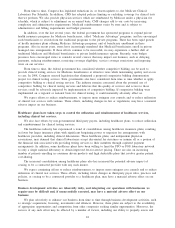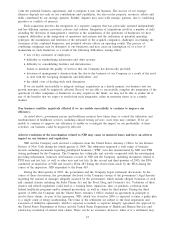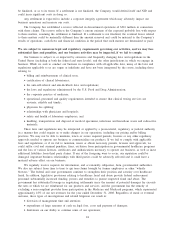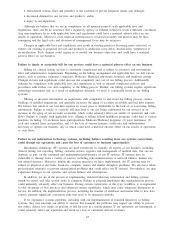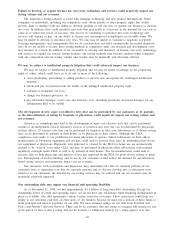Quest Diagnostics 2008 Annual Report Download - page 30
Download and view the complete annual report
Please find page 30 of the 2008 Quest Diagnostics annual report below. You can navigate through the pages in the report by either clicking on the pages listed below, or by using the keyword search tool below to find specific information within the annual report.medical boards or other entities authorized by these states to oversee the practice of medicine. In some states,
anatomic pathology services are delivered through physician-owned entities that employ the practicing
pathologists.
Contracts and Relationships with Physicians. In our anatomic pathology business, we employ pathologists.
Many of our pathologists enter into an employment agreement. These agreements have varying terms, but
generally can be terminated at any time, upon advance notice. Most of the agreements contain covenants
generally limiting the activities of the pathologist within a defined geographic area for a limited period of time
after termination of employment. The agreements may be subject to limitations under state law that may limit the
enforceability of these covenants.
Our pathologists are required to hold a valid license to practice medicine in the jurisdiction in which they
practice. If they provide inpatient services, they must become a member of the medical staff at the relevant
hospital, with privileges in pathology.
Fee-Splitting. Some states restrict the splitting or sharing of fees between physicians and non-physicians.
These laws may apply to some of the arrangements that we have with pathologists; the laws vary from state to
state.
Privacy and Security of Health and Personal Information; Standard Transactions. Healthcare providers
and others involved in providing healthcare services to patients are required to comply with the federal Health
Insurance Portability and Accountability Act (HIPAA) regulations regarding protecting the security and privacy of
certain healthcare information, as well as HIPAA standards for electronic healthcare transactions in the United
States. The HIPAA regulations on adoption of national provider identifiers required healthcare providers to adopt
new, unique identifiers for reporting on claims transactions. The security regulations establish requirements for
safeguarding electronic patient information. The privacy regulations establish comprehensive federal standards
regarding the uses and disclosures of protected health information. The regulations establish a complex regulatory
framework on a variety of subjects. We have implemented practices to meet the requirements of the regulations.
We also must comply with privacy and security laws and regulations adopted by states in the United States
and jurisdictions outside the United States in which we conduct business, including the European Union. Some of
these laws and regulations relate to the privacy and security of personal information, such as social security
numbers. Some of the laws and regulations impose reporting and disclosure requirements in the event of certain
security breaches. We have implemented practices to meet applicable requirements.
Controlled Substances. The federal Drug Enforcement Administration (“DEA”) regulates access to
controlled substances used to perform drugs-of-abuse testing in the United States. To obtain access to controlled
substances, laboratories must be licensed by the DEA. All of our laboratories in the United States that use
controlled substances are licensed by the DEA.
Compliance. We seek to conduct our business in compliance with all applicable laws and regulations. Many
of the laws and regulations applicable to us, however, including those relating to billing and reimbursement of
tests and those relating to relationships with physicians and hospitals, are vague or indefinite and have not been
interpreted by the courts. They may be interpreted or applied by a prosecutorial, regulatory or judicial authority
in a manner that could require us to make changes in our operations, including our pricing and/or billing
practices. The applicability or interpretation of laws and regulations also may not be clear in light of emerging
changes in clinical testing science and healthcare technology. Such occurrences, regardless of their outcome,
could, among other things:
•increase our operating costs including, but not limited to, those costs associated with performing clinical
or anatomic pathology tests or manufacturing or distributing products, and administrative requirements
related to billing;
•decrease the amount of reimbursement related to testing services performed;
•damage our reputation; and/or
•adversely affect important business relationships with third parties.
If we fail to comply with applicable laws and regulations, we could suffer civil and criminal penalties, fines,
exclusion from participation in governmental healthcare programs and the loss of various licenses, certificates and
authorizations necessary to operate our business, as well as incur additional liabilities from third party claims, all
of which could have a material adverse effect on our business. Certain federal and state statues, regulations and
other laws, including the qui tam provisions of the federal False Claims Act, allow private individuals to bring
lawsuits against healthcare companies on behalf of government payers, private payers and/or patients alleging
inappropriate billing practices.
18


